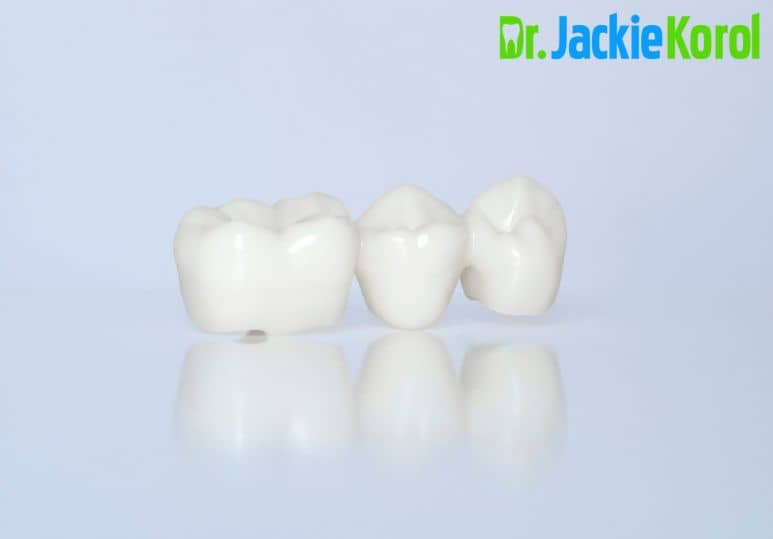Ceramic Dentistry: The Difference Between Inlays And Onlays

When you have a damaged tooth that needs repair, your dentist may recommend ceramic dentistry as treatment. You have probably heard of cavity fillings and probably even dental crowns. When your tooth has decay, your dentist may use a dental filling to repair it. If your tooth has incurred major damage, a dental crown may be used to cover the entire tooth structure for repair. But there are two ceramic dentistry options that fall between these two treatments: dental inlays and dental onlays. So what are these options and what is the difference between the two?
Dr. Korol is a Calgary dentist who focuses on her patient’s complete health with a team committed to providing the most advanced biocompatible dentistry solutions and technologies. Book your appointment to discuss your options for ceramic dentistry.
What Is Ceramic Dentistry?
Dental ceramics are widely used for dental repairs and cosmetic dentistry services. Ceramics are considered a biocompatible material that can be used to restore dental health without causing harmful side effects to your overall health. Ceramics are quite indiscernible from natural teeth and so are widely preferred for crowns, bridges, and veneers. Two uses of ceramic in restorative dentistry are inlays and onlays.
What Is A Dental Inlay?
A ceramic dental inlay is meant to repair damage to the surface of the tooth. Inlays are sometimes used to repair larger cavities as well. The difference between a dental filling and an inlay is that a filling is an amalgam or a composite material your dentist will use to fill the space of a cavity after cleaning out the area. This process usually only requires one visit to your dentist.
A dental inlay is a single, solid ceramic piece that is fabricated from a dental impression to precisely match the shape and size of your tooth. This customized inlay will be bonded to the surface of the tooth to replace the damaged area.
What Is A Dental Onlay?
When the damage to your tooth covers a significant area or is more severe due to a crack, fracture, or decay, but not severe enough to require a dental crown, your dentist may opt for a dental onlay. Where a crown will cover or replace the entire structure of a tooth above the gum line, and an inlay will be applied to a small area of the tooth cusp, an onlay will cover more area of the cusp of the tooth, but not require the more invasive removal of the tooth structure like a crown would.
Like dental inlays, a dental onlay is fabricated to match the size and shape of the tooth needing repair after an impression is taken. Your dentist will bond the onlay to the tooth after addressing the decay or damage.
Benefits of Inlays and Onlays
This ceramic dentistry solution is a biocompatible restoration option to repair teeth that are moderately damaged or decayed, but not damaged enough to require a dental crown. There are many benefits to ceramic dentistry. Ceramic inlays and onlays:
- Are made from durable, mercury-free, biocompatible materials which can last many years if properly maintained
- Strengthen teeth by up to 75%, unlike traditional metal fillings which can actually reduce the strength of your teeth
- Prolong tooth life and prevent the need for more extensive dental treatment in the future
Options For Biocompatible Ceramic Dentistry With Dr. Korol Dental
If you have a decayed or damaged tooth and you are seeking a healthy, holistic, and long-lasting alternative to traditional dental treatments, consider a ceramic dentistry solution. Ceramic inlays and onlays preserve your natural tooth structure, are biocompatible, durable, and can protect your teeth from further damage.
Dr. Korol and her skilled and compassionate team are committed to providing the highest quality and safest, most holistic approach to dental care, oral health, and overall well-being. We offer the newest and most effective treatments and technologies to support a lifetime of good health. Book your appointment by calling (403) 245-9099 or filling out our online form.
FAQ
The Canadian Association of Dentistry recommends patients visit their dentist once every six months.
On average, ceramic inlays and onlays can last 25-30 years. Proper care, regular cleanings and dental appointments, and healthy eating can help prolong the life of your ceramic restorations.
The biocompatible practice of ceramic dentistry is a focus of our practice. We offer a number of options for ceramic dental crowns. Learn more about your options by reading 4 Types Of Ceramic Dental Crowns.
CONTACT US
Questions? Comments? Call us today at 1-403-245-9099 or fill out the form below:


